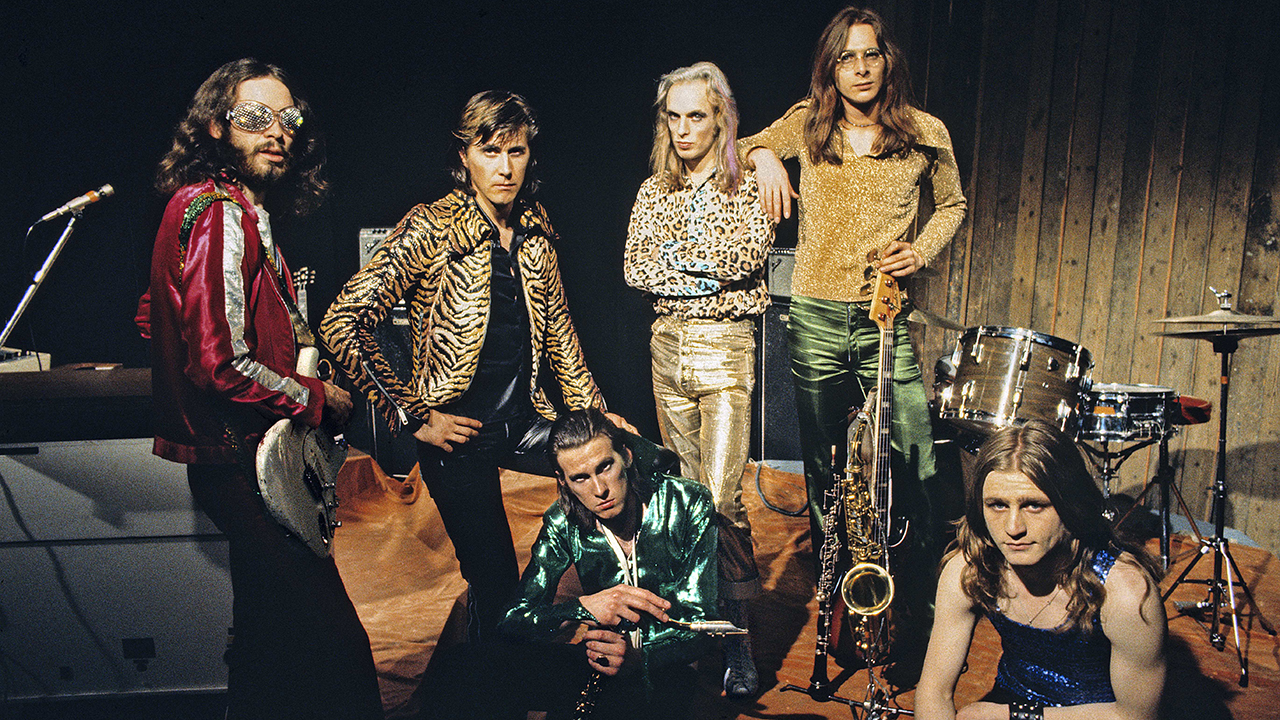You can trust Louder
It’s all very well tinkling out Silent Night, Stairway To Heaven and Eleanor Rigby,
and cracking jokes for a living, but Rick Wakeman has grasped that prog fans crave something a little more ambitious from their number one keyboard wizard. After enjoying playing King Arthur and Journey To The Centre Of The Earth in big live shows in recent years, and hearing the call from those who prefer his 70s stuff to his Bobby Crush phase, he’s recorded an instrumental prog album that taps into the DNA of those unrivalled classics of pomp while revving up the energy factor to contemporarily acceptable levels. He’s freely admitted he’s listened to the oldies and used sounds he heard therein that he hadn’t dabbled with for a long while. The process appears to have inspired him as, along with the three members of his “ensemble” – actually just an insanely proficient kick-ass band – his musical emissions make fora highly pleasurable mission to Mars.
It’s been 17 years since Wakeman’s last full-on prog album – 2003’s also space-themed Out There – but, on The Red Planet, the musician still captures the dramatic, dark mysteries of the distant unknown. He’s knowledgeable and genuinely fascinated with Mars, as he’s probed all the appropriate information and references its volcanoes and, er, topography here. An instrumental album could want to be about something and fail to evoke that but the tracks here succeed in conjuring up atmosphere, and the listener can happily get lost in its space. One can almost see the smile on his face as the muse strikes and the music reaches lift-off. And as he’s conceded, fans of vintage Yes will barely be able to believe their luck. This is very much a Wakeman album, not a Yes one, but those little flourishes and clever thematic connections he once brought to that party can be heard in close-to-delirium abundance.
Our extra-terrestrial getaway opens with portentous church organ. It’s instantly engaging, but deceptive: filmic as it is, things are about to get a lot more busy and exciting. In come the band, and before one can say “little green men” Wakeman’s soloing over their solid tracking shots. Throughout the album, Dave Colquhoun’s guitar serves the overall feel and goes for broke when given its close-ups. Drummer Ash Soan is heavy without hogging the show, while bassist Lee Pomeroy subtly places in some lovely bubbling runs. They’re a perfect foil to the composer’s imagination and flair. There are moments where he’s channelling everyone from Jean-Michel Jarre to Space (of Magic Fly, um, fame), but, of course, he’s always Wakeman.
On Tharsis Tholus, The English Rock Ensemble float in with a mellow moodiness that’s not entirely dissimilar to Camel’s The Snow Goose, but this is, after all, progressive music, so matters swiftly mix about with a few higgledy-piggledy time signature tricks and high-pitched keyboard solos until you’re almost reminded of Fragile. Rick really gets going here, fastest fingers first: you can feel the cape. Okay, he probably wasn’t wearing one during the take, but it sounds like he just might have got fully immersed into character.
Arsia Mons jabs and stabs like Keith Emerson assaulting his Moog, but the band latch onto a series of waves that are slightly Focus, slightly Nektar, slightly Argent (hey, nobody said this was a grime album). It’s all held beautifully together by the fluid transitions Wakeman has always been adept at. Just as his musicality used to tape together all Yes’ bonkers bits and pieces until they felt inevitable and right, so he here marries an acoustic break and more solid, steak-and-chips surges. On Olympus Mons the drums kick unapologetically yet the light seems to darken: we’re in terrain that somehow seems both familiar and unfamiliar.
The album’s second half builds from the eerie starting sequence of The North Plain – where each piano note feels like a step away from the mothership into sinister clouds – into, unexpectedly, a kind of funk-prog, with the rhythm team enjoying themselves like they’re briefly on Chairmen Of The Board’s album Skin I’m In. We’re back to crashing chords and insistent melodies for Pavonis Mons, which sounds almost too upbeat for the context, shredding solos raining down. There’s a more meditative, reflective pace on South Pole, which leads neatly onto the switch from overzealous bustling to attained serenity that occurs in the 10-minute finale Valles Marineris. In truth, this closer is just moseying along inoffensively for sections, as if we’re all heading back down to Earth, tired but sated (and certainly entertained) by what we’ve heard on this tempestuous, illuminating trip to the fourth planet from the Sun.
It’s a joy to hear Wakeman going large, doing what most of us consider to be what
he does best: taking risks and landing it. The jury’s in: there is life on Mars.
Sign up below to get the latest from Prog, plus exclusive special offers, direct to your inbox!
Chris Roberts has written about music, films, and art for innumerable outlets. His new book The Velvet Underground is out April 4. He has also published books on Lou Reed, Elton John, the Gothic arts, Talk Talk, Kate Moss, Scarlett Johansson, Abba, Tom Jones and others. Among his interviewees over the years have been David Bowie, Iggy Pop, Patti Smith, Debbie Harry, Bryan Ferry, Al Green, Tom Waits & Lou Reed. Born in North Wales, he lives in London.


